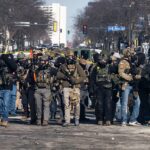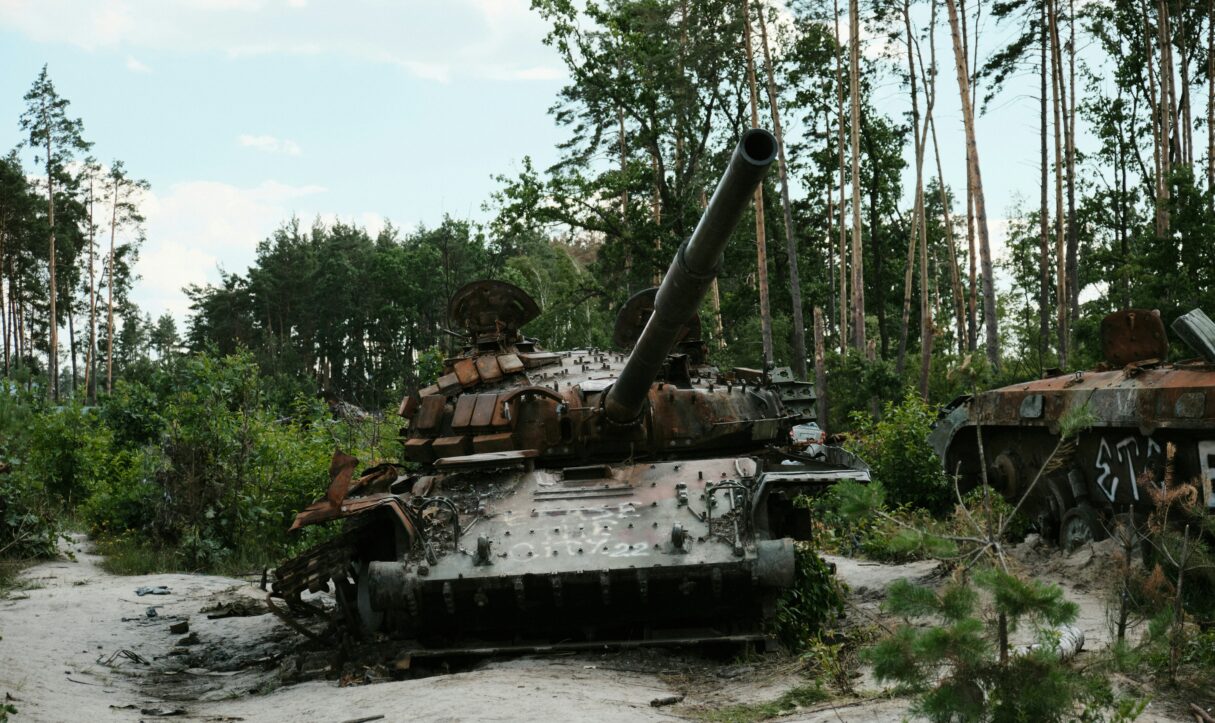More than three years into Russia’s full-scale invasion of Ukraine, the war grinds on. The fighting has killed hundreds of thousands of people and displaced millions more. In defiance of international law, Russia has tortured prisoners, targeted civilian infrastructure, and used sexual violence against civilians as a weapon of war. Meanwhile, Ukraine has used internationally banned cluster munitions and violated their treaty obligations per the Mine Ban Treaty.
The Russian war in Ukraine has ground into a stalemate, but the need for peace has never been greater. President Trump has recently sold air defense systems, missiles, and ammunition to NATO to be then sold onward to the Ukrainians. Trump and Russian President Vladimir Putin’s relationship appears to be souring, culminating with Trump issuing a 50-day ultimatum to Putin, giving the Russian president a little less than two months to reach a ceasefire, or face severe sanctions. The impact of this ultimatum on the negotiations remains unclear. Failure to make progress toward peace threatens more than sanctions; it will lead to more casualties for combatants and civilians, and delay or deny justice for war crimes.
This devastating conflict has its roots in 2014, when Russian forces marched into Ukraine and occupied Crimea. Under the guise of “denazification,” Russia launched its full-scale invasion of Ukraine in 2022. It ignited a full-scale humanitarian and geopolitical crisis. For the first time in the 21st century, a full-blown war was taking place on mainland Europe.
The war has appeared in international headlines day in and day out for more than three years, but the world has failed to restrain Russia. Billions of dollars in weapons have flowed into Ukraine and still, peace remains elusive. The absence of meaningful international leadership and peacemaking reveals the urgent need for global partnerships predicated on human security, not threats of force.
Ukraine and Russia are in a destructive stalemate that has devastated regional economies, fractured societies, and undermined trust in the international community’s ability to enforce sovereignty and protect civilians. These conditions raise fundamental questions about the value of military alliances and cast doubt on the role of the United States.
It makes the obvious plain: Peace will not come on the battlefield. The war will end at a negotiating table. The only question is how much more destruction occurs before the parties take their seats.
A new report from the Friends Committee for National Legislation, “The War in Ukraine and the Need for Diplomatic Solutions,” asserts that negotiations must go beyond silencing guns to achieve sustainable peace. A durable and equitable peace should be inclusive and gender-informed, prioritize humanitarian assistance, and promote social cohesion. Congress should bring US foreign policy into alignment with international law, pursue nuclear arms control, encourage democratization in Ukraine, and allow the Russian people to experience the rewarding dividends of peace.
Any peace negotiations and agreement must be inclusive. Women, youth, and civil society leaders need to have a seat at the table. Gender-based violence has surged in Ukraine since the war began. This is driven by PTSD plaguing returning soldiers, and by changes in housing caused by forced migration and the destruction of homes.
Too many women and girls in Ukraine bear the scars of gender-based violence as a weapon of war. Peace efforts must consider these realities and offer psychological and medical support to victims. They must also ensure that the psychological wounds of this war do not fuel continued violence against women and girls.
Any peace agreement must also include strategic humanitarian assistance and robust social cohesion efforts. Ukraine will need targeted humanitarian aid to rebuild communities rocked by Russian occupation and forced displacement. This aid must be delivered in a way that strengthens social cohesion between those who remained in occupied territories, those in unoccupied territories, and those who had left the country and returned following the conclusion of a peace agreement.
Aid distribution must not drive civilians back to dangerous regions in search of help. Too often, aid concentrated in the areas of greatest need — the frontlines in the east — has forced civilians who previously fled west to safety to return to more militarized and dangerous areas for assistance.
There is a clear need for new models of regional security. The current hyper-militarized arrangements have neither deterred violence nor brought about accountability and justice. A better system would emphasize diplomacy, not deterrence, and prioritize human security over arms races.
Congress can support such change by reinforcing US commitment to international law, including fully funding its dues to the United Nations. Furthermore, the International Criminal Court (ICC) should be supported, not sanctioned, as it investigates war crimes.
The current hyper-militarized arrangements have neither deterred violence nor brought about accountability and justice.
There are major political barriers in the US to making such policy shifts a reality. The United States is not a party to the Rome Statute nor a member of the ICC; President Trump sanctioned the ICC after it issued arrest warrants for Israeli Prime Minister Benjamin Netanyahu and Former Minister of Defense Yoav Gallant. Trump has long been hostile to the Ukrainian cause. He has said that Ukraine started the war, and in February summoned Ukrainian President Zelenskyy to the White House for a humiliating shakedown in which he accused Zelenskyy of being insufficiently “grateful.” American voters, and particularly Republicans, express waning support for Ukraine.
To reduce the incidence of civilian harm from cluster munitions and landmines, and to decrease the risk of nuclear war, the Trump administration must make arms control a top priority. This includes recommitting to treaties like New START and joining the Mine Ban Treaty and Convention on Cluster Munitions. Just as importantly, Russia and Ukraine must stop using anti-personnel landmines and cluster munitions, and Ukraine must fulfill its treaty obligations as a party to the Mine Ban Treaty.
The international community should allow the Ukrainian people to define their own future, which means protecting their right to free elections, investing in anti-corruption efforts, and ensuring robust democratic institutions. A postwar Ukraine will face significant risk of democratic backsliding and fragmentation. The US should continue to invest in supporting Ukrainian civil society, peacebuilding, media, and democratic infrastructure.
The Russian people should also feel the benefits of peace dividends. Russia should not be left impoverished and isolated. The world should welcome them into the fold if they support a just and sustainable peace. Sanctions relief, economic cooperation, and reintegration into international systems could accomplish this. A devastated, resentful Russia is not in the global interest. A free, democratic, and prosperous Russia is.
Secretary of State Marco Rubio and President Donald Trump have a window now to make good on their pledge to “stop the killing.” It is time for Congress and the Trump administration to act together for peace in Ukraine. Failure to do so would have dire implications for abducted and forcibly “Russified” Ukrainian children, prisoners of war held incommunicado, and the more than six million Ukrainian women who desperately need humanitarian assistance. Peace can’t wait in a war that has taken so much from so many.














